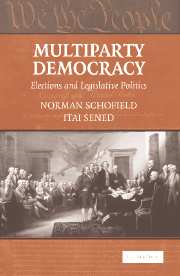Book contents
- Frontmatter
- Contents
- List of Tables and Figures
- Preface
- 1 Multiparty Democracy
- 2 Elections and Democracy
- 3 A Theory of Political Competition
- 4 Elections in Israel, 1988–1996
- 5 Elections in Italy, 1992–1996
- 6 Elections in the Netherlands, 1979–1981
- 7 Elections in Britain, 1979–2005
- 8 Political Realignments in the United States
- 9 Concluding Remarks
- References
- Index
- POLITICAL ECONOMY OF INSTITUTIONS AND DECISIONS
7 - Elections in Britain, 1979–2005
Published online by Cambridge University Press: 06 July 2010
- Frontmatter
- Contents
- List of Tables and Figures
- Preface
- 1 Multiparty Democracy
- 2 Elections and Democracy
- 3 A Theory of Political Competition
- 4 Elections in Israel, 1988–1996
- 5 Elections in Italy, 1992–1996
- 6 Elections in the Netherlands, 1979–1981
- 7 Elections in Britain, 1979–2005
- 8 Political Realignments in the United States
- 9 Concluding Remarks
- References
- Index
- POLITICAL ECONOMY OF INSTITUTIONS AND DECISIONS
Summary
The previous chapters on the proportional electoral systems of Israel, Italy, and the Netherlands have considered the hypothesis that the policy positions of parties were chosen not simply to maximize vote-shares, but incorporated strategic concerns over the effect of position on the probability of joining a government coalition. However, this coalition consideration is generally not present in the plurality electoral system of Britain. (For convenience we use the term Britain for the United Kingdom). We can therefore use our electoral model for this polity to determine the degree to which simple vote-maximization characterizes policy choices. We first discuss the MNP model used by Quinn, Martin, and Whitford (1999) to study the election of 1979 in Britain, and then extend the analysis to MNL models of the 1992 and 1997 elections. In all three cases the estimated parameters give low convergence coefficients. Theorem 3.1 then implies that convergence to the electoral center should have occurred under vote-share maximization.
Since there is no evidence of convergence by the major parties in Britain (Alvarez, Nagler, and Bowler, 2000) we develop the activist valence model mentioned in the previous chapter. We now allow the contributions of activists to indirectly enhance the valence of the party leader. The principal result we offer shows that there is a tradeoff to be made between the leader's “exogenous” valence and this “indirect” valence induced by the activists for the party.
We suggest that the valence of the Labour Party, under Tony Blair, increased in the period up to 1997.
- Type
- Chapter
- Information
- Multiparty DemocracyElections and Legislative Politics, pp. 151 - 174Publisher: Cambridge University PressPrint publication year: 2006



